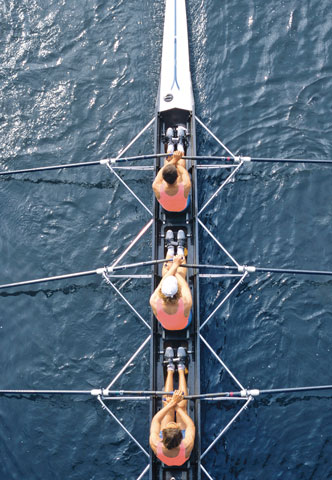
It is quiet out here on the Schuylkill River in Philadelphia at 5:30 a.m. The sun is just beginning to rise above the trees. The rhythmic slicing of oars in and out of the water from magna-cum-serious rowers in sleek shells breaks the still of silence. I am in the Temple University crew coach's boat ripping alongside the heavyweight eight boat. Gavin White is barking coaching advice to his team through a bullhorn. Me? I'm searching beyond the physical dimensions of the sport, to understand more about its spiritual components, because, in my way of thinking, rowing is imbued with definite spiritual overtones.
The athletes are digging into the depths of their souls to surmount the suffering of the physical challenge -- the exhaustive anaerobic effort, the hard burn of muscles, the rough, choppy current, the cold, windy weather, all of which can drive even the most determined hearts and minds into surrender. But these rowers don't quit. The dissonance of the suffering finds consonance in the love of the sport. They share a communion with the water. Like baptism, the water is cleansing, the forgiving part of a tough, physically hard journey.
The training session is over in 90 minutes. A rower for Temple in the early 1980s, Charlie Bracken, said rowing can change the perception of life, the same change in perception discovered from watching a sunset by the sea or smelling a fresh rose. Philosophers call such enlightenment "qualia" a term that alludes to an inner quality of experience.
In life on the water, rowers must forget that they are individuals, but instead recognize at once they must be a collective amalgam of muscles and bones with a consciousness of faith and trust in each other. This reach for perfect simpatico cannot be achieved by applied mathematics, but by the light of the heart.
It is the only way that rowers are able to never waiver in their feelings of love for their sport, for the water, for their teammates. This creed sticks to their souls like a first kiss sticks to their lips, for rowing embraces the sacred, the transcendent and the faith.
Rowing is more than sport; it is a network of kinship. Catholics are taught from a very young age to stand in a sacred kinship with their bloodlines, those things that help to tie us together, and, yes, save us: a death in the family, a marriage ceremony, the honest faith and zeal of a parish priest, the birth and baptism of children, high school reunions, and, most of all, love and loyalty to family. All these waves of kinship are as contagious as the traditions they have built.
With rowers, kinship is evident more than in any other sport. Sweeping always into their conversations are stories of moms and dads, grandmoms and granddads who have gone before them in this sport. In a culture that reveres youth -- and staying young -- sometimes our young can have the sensitivity of sandpaper when it comes to their elders. The sport of rowing rejoices in its renewal of the past and the present circling back upon each generation to find the sacredness of connections to each other and to themselves. It brings about a sense of place and belonging. It brings about sacred kinship.
A popular quote puts it best: "Prayer works when all else fails." The best attempts of materialists through the centuries have failed to reduce the irreducible power of prayer. These days so many athletes in other sports -- baseball, football, basketball, tennis, golf -- pursue with wrong-pointed passion the meretricious rewards of money, glory and power. Often this pursuit results in perditions of the soul, and often these athletes find themselves at a terminus where nothing is left but emptiness, a kind of precipice with nothing out there but a fall.
In our present-day sports culture, so many college and professional athletes in the major sports define the future as next week or next month. Yet the sport of rowing enjoys an indwelling and sustainable force of the soul and the spirit, which speaks these words to its athletes: Okay, the sport may be the highest, best experience in the world -- but only until the next world.
The spiritual components of rowing help to elevate the promise of a new and better life.
White, the highly successful crew coach at Temple University and a Catholic, told me: "In the sport of rowing, the athletes have to have implicit faith in each other and in God to survive."
So, yes, for me this day on the river is both a human and spiritual experience. The faith and loyalty I see in the rowers to each other and to God only solidifies in me the feeling that rowing -- in its honest distillate -- is a sport that teaches its athletes the precise measure of the soul.
[B.G. Kelley is a nationally published writer who has been a contributing essayist to The Philadelphia Inquirer editorial pages for 25 years. His father was a top-tier local Philadelphia rower on the Schuylkill River during the 1930s and l940s, rowing alongside three-time Olympic gold medal winner John B. Kelly.]



